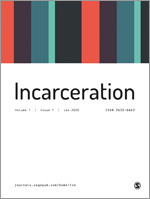
Incarceration
An international journal of imprisonment, detention and coercive confinementIncarceration is the primary publication for peer-reviewed articles relating to all forms of coercive confinement, including imprisonment, immigration detention and other forms of institutional and non-institutional confinement. It provides a unique forum for articles that focus on the experience, dynamics, modes, cultures, determinants and effects of all forms of incarceration. Incarceration is a continuous publication journal.
Submit your manuscript today at https://mc.manuscriptcentral.com/ICN
The aim of Incarceration: An international journal of imprisonment, detention and coercive confinement is to publish high quality original scholarship dealing with prisons and prison-like institutions and practices, including police custody, court cells, hostage-taking, kidnapping, rendition, pre-trial/ remand institutions, immigration detention centres, juvenile detention centres, reformatory schools, secure psychiatric hospitals and other places and experiences of coercive confinement. The journal welcomes submissions on virtual confinement, such as electronic monitoring and house arrest, and work that considers coercive practices in the community, where they are linked to pre-release incarceration. In summary, Incarceration focuses on empirically informed and theoretically robust analyses of these institutions as social systems and on understanding the everyday life of working, living in and managing places of coercive confinement.
| Diana Johns | University of Melbourne, Australia |
| Ian O'Donnell | University College Dublin, Ireland |
| Ben Crewe | University of Cambridge, UK |
| Yvonne Jewkes | University of Bath, UK |
| Thomas Ugelvik | University of Oslo, Norway |
| Mahuya Bandyopadhyay | Department of Humanities and Social Sciences, Indian Institute of Technology Delhi, India |
| Jamie Bennett | Youth Justice Board, UK |
| Mary Bosworth | University of Oxford, UK |
| Bree Carlton | University of Melbourne, Australia |
| Jill McCorkel | Villanova University, USA |
| Reuben Miller | University of Chicago, USA |
| Eoin O’Sullivan | Trinity College Dublin, Ireland |
| Maximo Sozzo | National University of Litoral, Argentina |
| Laura S. Abrams | UCLA, USA |
| Kristel Beyens | Vrije Universiteit Brussel, Belgium |
| Michelle Brown | University of Tennessee, USA |
| Sandra Bucerius | University of Alberta, Canada |
| Victoria Canning | University of Lancaster, UK |
| Anastasia Chamberlen | University of Warwick, UK |
| Gilles Chantraine | CLERSE – CNRS, France |
| Leonidas Cheliotis | London School of Economics, UK |
| Alexandra Cox | University of Reading, UK |
| Sacha Darke | University of Westminster, UK |
| Julie de Dardel | Université de Genève, Switzerland |
| Rod Earle | Open University, UK |
| Tomer Einat | Bar-Ilan University, Israel |
| Catarina Frois | ISCTE - Instituto Universitário de Lisboa, Portugal |
| Kate Gooch | University of Bath, UK |
| Kevin Haggerty | University of Alberta, Canada |
| Mark Halsey | Flinders University, Australia |
| David Hayes | University of Sheffield, UK |
| Andrew M. Jefferson | DIGNITY - Danish Institute Against Torture, Denmark |
| Elena Larrauri | Pompeu Fabra University, Spain |
| Cetta Mainwaring | University of Edinburgh, UK |
| Liam Martin | Victoria University of Wellington, New Zealand |
| Tomas Max Martin | DIGNITY - Danish Institute Against Torture, Denmark |
| Fergus McNeill | University of Glasgow, UK |
| Rimple Mehta | Western Sydney University, Australia |
| Claudio Minca | University of Bologna, Italy |
| Renaud Morieux | University of Cambridge, UK |
| Joshua Page | University of Minnesota, USA |
| Francis Pakes | University of Portsmouth, UK |
| Carla Reeves | University of Huddersfield, UK |
| Ashley Rubin | University of Hawaii, USA |
| Anna Schliehe | University of Bonn, Germany |
| David Skarbek | Brown University, USA |
| Layla Skinns | University of Sheffield, UK |
| Gavin Slade | Nazarbayev University, Kazakhstan |
| Esther van Ginneken | Leiden University, the Netherlands |
| Michael Walker | University of Minnesota, USA |
| Jason Warr | University of Nottingham, UK |
| Julienne Weegels | CEDLA – University of Amsterdam, Netherlands |
| Jacqueline Wilson | University of Melbourne, Australia |